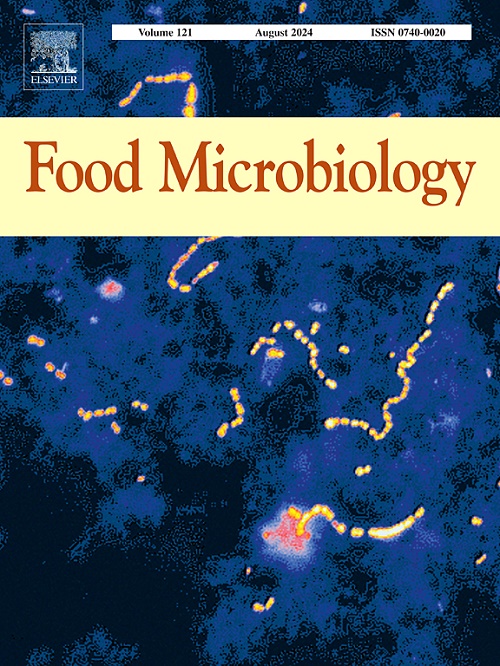大镰刀霉PH3缓解南果梨果实膨胀青霉病的机制
IF 4.5
1区 农林科学
Q1 BIOTECHNOLOGY & APPLIED MICROBIOLOGY
引用次数: 0
摘要
扩张青霉是导致水果和蔬菜腐烂的主要病原体之一。蓝霉病的发展会破坏农产品的外观和营养价值,导致重大经济损失。最近的研究表明,内生菌作为潜在微生物制剂的重要组成部分,可以控制各种真菌疾病。本研究主要探讨了花生内生菌 Priestia megaterium PH3 对南国梨蓝霉病的抑制机制。结果表明,内生菌 P. megaterium PH3 及其代谢产物不仅能抑制扩张孢子囊的孢子萌发,还能抑制扩张孢子囊的孢子萌发。最值得注意的是,在南国梨果实表面快速定殖后,巨毛菌 PH3 能增强抗氧化酶(SOD、CAT、APX、MDHAR、DHAR 和 GR)和非酶抗氧化剂(AsA 和 GSH)的活性,抑制扩张孢子菌感染引起的 ROS 激增。此外,巨孢蘑菇 PH3 还能上调与酚类代谢相关的酶(PAL、C4H、4CL、PPO 和 POD)的活性和基因表达(PuPAL、PuC4H 和 Pu4CL),促进酚类和类黄酮化合物的合成和代谢,有效抑制南国梨蓝霉病的发生。这些研究结果表明,P. megaterium PH3 是减轻南国梨采后蓝霉病的一种有效微生物制剂。本文章由计算机程序翻译,如有差异,请以英文原文为准。
Mechanisms of Priestia megaterium PH3 in alleviating postharvest disease caused by Penicillium expansum in Nanguo pear fruit
Penicillium expansum is one of the primary pathogens causing rot in fruit and vegetables. The progression of blue mold damages the appearance and nutritional value of produce, leading to significant economic losses. Recent studies have shown that endophytes, as a vital component of potential microbial agents, can control various fungal diseases. This study focuses on the inhibitory mechanism of the peanut endophyte Priestia megaterium PH3 against blue mold in Nanguo pear. The results demonstrated that the endophytic P. megaterium PH3 and its metabolites not only inhibit the spore germination of P. expansum. Most notably, after rapidly colonizing the surface of Nanguo pear fruit, P. megaterium PH3 enhances the activity of antioxidant enzymes (SOD, CAT, APX, MDHAR, DHAR and GR) and non-enzymatic antioxidants (AsA and GSH), suppressing the ROS surge caused by P. expansum infection. Additionally, the P. megaterium PH3 upregulates the activity of enzymes (PAL, C4H, 4CL, PPO and POD) and gene expression (PuPAL, PuC4H and Pu4CL) related to phenolics metabolism, promoting the synthesis and metabolism of phenolics and flavonoids compounds, effectively inhibiting the onset of blue mold in Nanguo pear. These findings indicate that P. megaterium PH3 is a promising and effective microbial agent for mitigating postharvest blue mold in Nanguo pear.
求助全文
通过发布文献求助,成功后即可免费获取论文全文。
去求助
来源期刊

Food microbiology
工程技术-生物工程与应用微生物
CiteScore
11.30
自引率
3.80%
发文量
179
审稿时长
44 days
期刊介绍:
Food Microbiology publishes original research articles, short communications, review papers, letters, news items and book reviews dealing with all aspects of the microbiology of foods. The editors aim to publish manuscripts of the highest quality which are both relevant and applicable to the broad field covered by the journal. Studies must be novel, have a clear connection to food microbiology, and be of general interest to the international community of food microbiologists. The editors make every effort to ensure rapid and fair reviews, resulting in timely publication of accepted manuscripts.
 求助内容:
求助内容: 应助结果提醒方式:
应助结果提醒方式:


